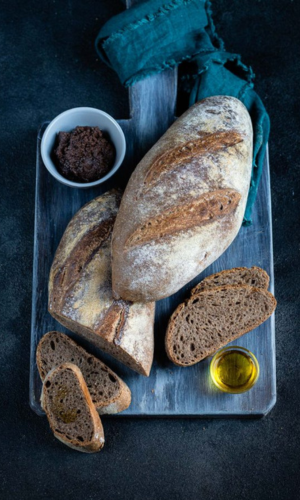All our products are MADE IN ITALY
Lake Garda, with its crystal-clear waters and breathtaking landscapes, is not only a top tourist destination, but also a melting pot of rich culinary traditions that have their roots in a history deeply tied to the land and its resources. At the heart of this gastronomic heritage is an ingredient that is surprising in its simplicity and elegance: molche , or olive paste - the solid residue from pressing. This unique product is born from the expert processing of olives, the symbolic fruit of the region, transformed into a rustic paste that embodies the very essence of the Garda area. Through the use of olive paste in various culinary preparations, from appetizers to condiments for first courses, the union between innovation and tradition is celebrated. The rustic bread embellished with this delight bears witness to how the gastronomic culture of the Lake can be both the guardian of ancient customs and open to new interpretations. The rustic olive pasta from Agraria Riva del Garda represents one of the most authentic and refined expressions of this indissoluble bond between past and future, offering us a genuine taste of the culinary traditions that make Lake Garda a timeless place in the Italian food and wine panorama.
The "pan di molc"  he" represents a traditional and fundamental element in the culinary panorama of the Lake Garda area, particularly rooted in the sustainable agricultural practices and food culture of this region. This product, whose name literally translates to "bread of olive residues", is closely linked to oil production, being made from the residues of olive pressing.
he" represents a traditional and fundamental element in the culinary panorama of the Lake Garda area, particularly rooted in the sustainable agricultural practices and food culture of this region. This product, whose name literally translates to "bread of olive residues", is closely linked to oil production, being made from the residues of olive pressing.
The practice of reusing molche to produce bread is not only a clear example of a circular economy ante litteram but also represents a culinary knowledge that has its roots in a historical necessity: that of not wasting any part of the harvest and of valorizing every product of the earth. In times when food was precious and nothing could be left to chance, pan di molche became a way to nourish oneself while fully respecting the environment and its resources.
From a nutritional point of view, this special bread stands out for its fiber content and a light aromatic note derived from the olive skin, which makes it unique. Its production, however, requires specific knowledge both in the choice of the molche - which must be free from any chemical treatment - and in the process of fermentation and baking of the bread itself.
Today, pan di molche is a witness to the growing attention towards sustainable food practices and the rediscovery of authentic flavors linked to the territory. Although it is not as widespread as other Italian bakery products, it represents a cultural and food and wine heritage to be preserved and promoted.
As an expert in the sector, I emphasize the importance of supporting the artisanal production of pan di molche and other similar initiatives that promote culinary biodiversity and commitment to sustainability. Through knowledge and valorization of our traditional products, we can contribute to building a more conscious and equitable food future for all.




